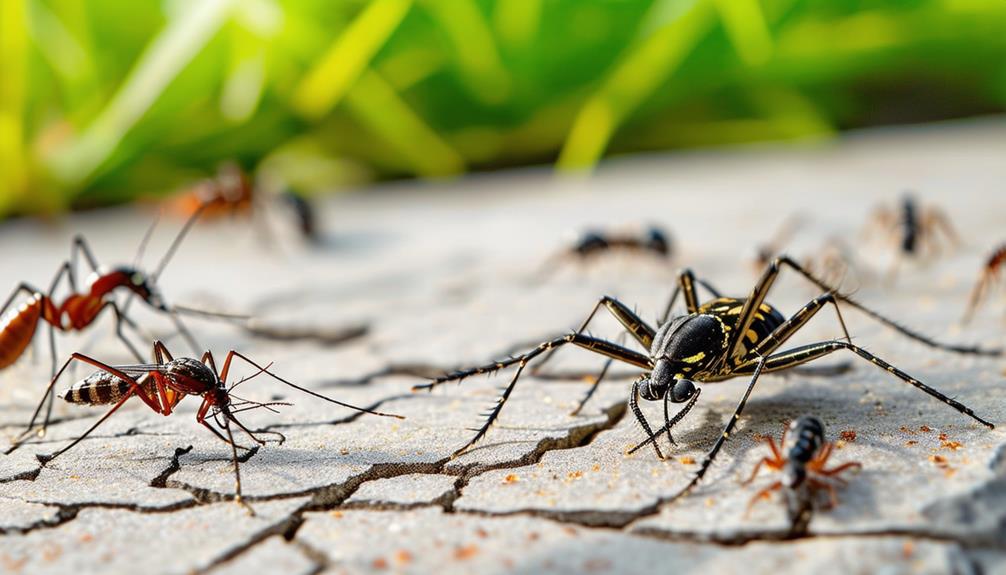When it comes to handling pests in Utah, the convenience of over-the-counter products may seem appealing. However, have you considered the potential risks associated with these quick fixes? The use of certain chemicals in OTC pest control products raises concerns about both human health and the environment. Before you reach for that next can of spray, it might be wise to pause and explore the hidden dangers that could be lurking within these seemingly harmless solutions.
Key Takeaways
- OTC pest control products in Utah pose health risks due to toxic ingredients.
- Chemical runoff from OTC products harms water sources and biodiversity.
- Regulation by Utah Department of Agriculture ensures safety and efficacy.
- Eco-friendly alternatives like IPM and natural repellents offer safer pest control.
- Public awareness about dangers of OTC pesticides is crucial for health and the environment.
Health Risks of OTC Pest Control
Exposure to toxic ingredients like pyrethroids and organophosphates in over-the-counter pest control products poses significant health risks, including neurodevelopmental disorders and reproductive abnormalities. Pyrethroids, commonly used in these products, have been associated with conditions such as autism, ADHD, and hormone-related cancers. Organophosphates like naled, another prevalent ingredient, can adversely affect the nervous, circulatory, and immune systems. In the context of mosquito control, where pesticide spraying is common to combat diseases like West Nile Virus, the use of these chemicals raises concerns about the potential health impacts on individuals.
Utah Physicians have raised alarms about the indiscriminate use of over-the-counter pest control products due to the serious health risks they pose. The convenience of these products must be weighed against the potential harm they can cause. Considering the link between pesticide exposure and various health issues, it's essential to prioritize safer alternatives and adopt more sustainable pest control practices to mitigate the associated health risks.
Environmental Impact of OTC Pest Control
The environmental impact of over-the-counter pest control products in Utah is an urgent concern due to their contribution to pollution through chemical runoff into water sources and the potential harm they pose to wildlife and ecosystems. Improper disposal of these products can result in contamination of soil and water, adversely affecting non-target organisms.
OTC pest control products often contain harmful ingredients that can persist in the environment, leading to long-term risks for ecosystems. Residues from these products may accumulate in the environment, impacting biodiversity and potentially causing ecological imbalances.
The widespread use of OTC pest control products in Utah can also result in unintended consequences such as pesticide resistance. It's essential to take into account the agricultural states of these chemicals, as they can have far-reaching effects on the environment beyond their intended use.
Proper management and disposal of OTC pest control products are vital to mitigate their environmental impact and safeguard ecosystems.
Regulation of OTC Pest Control
Regulating over-the-counter pest control products in Utah falls under the jurisdiction of the Utah Department of Agriculture and Food (UDAF). The UDAF is responsible for overseeing the registration and labeling of these products to guarantee their safety and efficacy in pest abatement.
Strict regulatory standards are in place, covering aspects such as active ingredients, application methods, and user safety precautions. These regulations are designed to safeguard both human health and the environment from potential harm associated with pesticides.
Consumers are advised to choose UDAF-approved products to secure the effectiveness and safety of OTC pest control treatments in Utah. By adhering to the UDAF's guidelines, individuals can mitigate risks related to the misuse or overuse of pest control products, promoting a healthier and safer living environment for themselves and their communities.
It's important to prioritize safety and compliance with regulations when handling OTC pest control solutions to prevent adverse effects on health and the ecosystem.
Alternative Pest Control Methods
To address pest issues without relying solely on chemical treatments, exploring alternative pest control methods can provide effective and eco-friendly solutions. Integrated Pest Management (IPM) techniques focus on long-term prevention of pests by combining biological, physical, and cultural controls.
These eco-friendly alternatives include sealing entry points, reducing food sources, and using traps to manage pest populations sustainably. Natural repellents like essential oils are also effective in deterring pests without the use of harmful chemicals, promoting a healthy environment.
Additionally, employing biological controls such as introducing natural predators or parasites can help control pest populations naturally. Physical barriers like screens, caulking, and netting offer a non-toxic way to prevent pests from entering buildings.
Beneficial insects like ladybugs or nematodes can be utilized to manage pests without adverse effects on the environment, providing safe and efficient pest control methods. By implementing these eco-friendly alternatives, you can effectively address pest issues while maintaining a healthy environment.
Public Awareness on OTC Pest Control
Publicly disseminating information about the potential risks associated with over-the-counter (OTC) pest control products in Utah is essential for promoting informed decision-making among consumers. The presence of dangerous ingredients in many OTC pest control products poses a significant risk to human health and the environment. Without proper training or guidance, individuals may misuse these products, leading to unintended health hazards.
Educating the public on the potential dangers of OTC pesticides is important to minimize chemical exposure and its associated health risks. By increasing awareness about safer alternatives and advocating for responsible pest control practices, individuals can make informed choices to protect both themselves and the environment.
Organizations like the Mosquito Abatement District play a significant role in raising public awareness and promoting the safe and effective use of pesticides. Through education and outreach efforts, consumers can better understand the risks associated with OTC pest control products and make informed decisions to safeguard their well-being and the ecosystem.
Frequently Asked Questions
What Are the Risks of Pest Control?
When using over-the-counter pest control products, you face potential health concerns and environmental impact. Improper application can lead to residue contamination, allergic reactions, and long-term effects. Consider regulatory oversight and alternative solutions to avoid risks.
What Are the Side Effects of Pest Control Chemicals on Humans?
When exposed to pest control chemicals, humans may experience a range of health effects like skin irritation, respiratory issues, and neurological impacts. It is essential to prioritize safety precautions, limit long-term exposure, and consider alternative solutions to minimize risks.
Is Pest Control Spray Toxic to Humans?
When using pest control spray, remember its potential health effects. Safety concerns arise from chemical exposure, causing respiratory issues. Be cautious of the environmental impact. Follow safety instructions to mitigate risks to human health.
How Long After Spraying Pesticides Is It Safe for Humans?
After spraying pesticides, it's essential to prioritize safety precautions. Reduce exposure risks by following label instructions. Ventilate treated areas for better air quality. Consider potential health concerns, environmental impact, and residue levels. Consult professionals for guidance.




